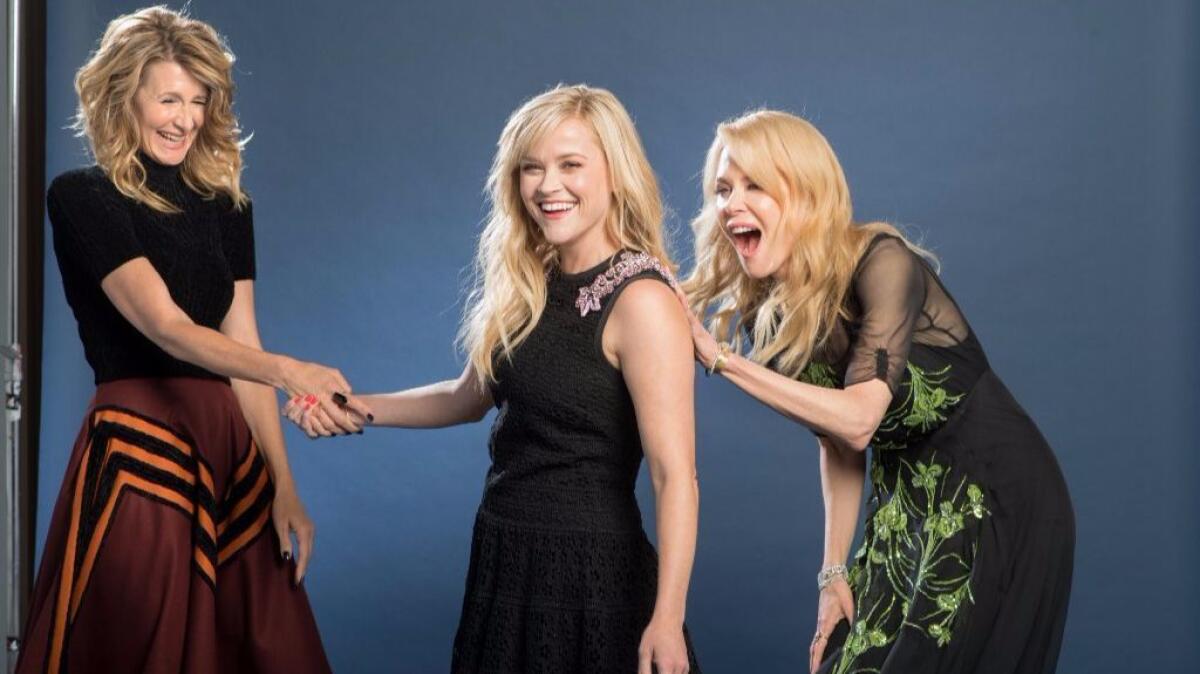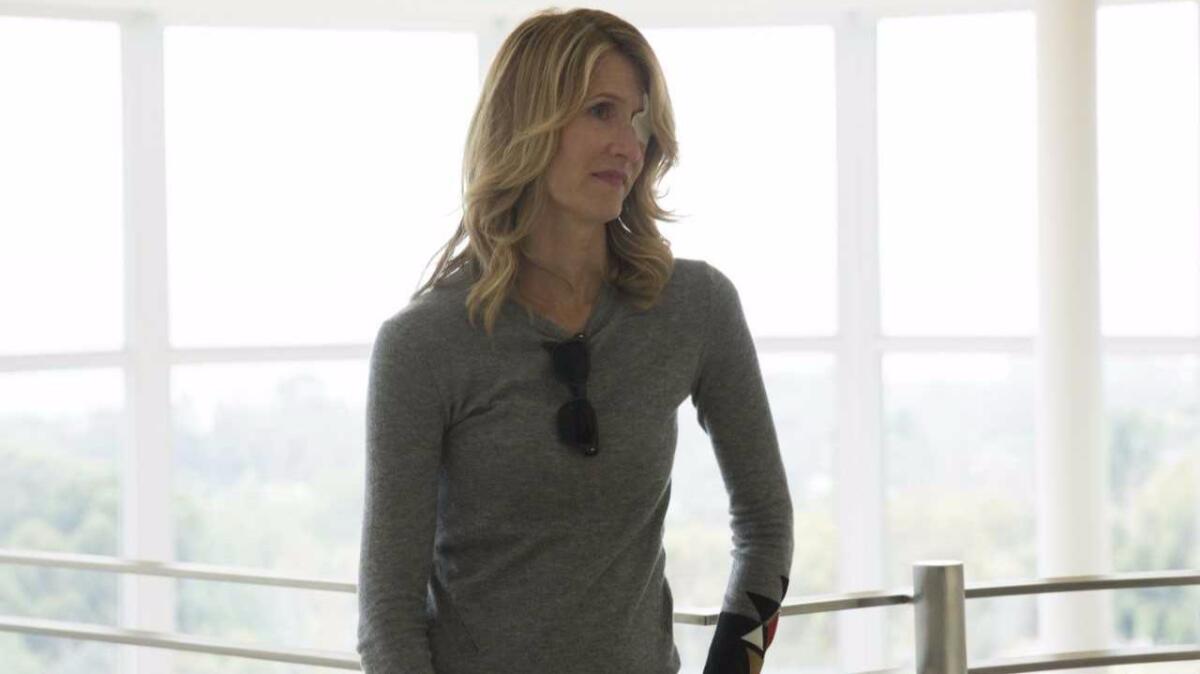Q&A: Nicole Kidman, Reese Witherspoon and Laura Dern talk sex, ‘Lies’ and a second chapter for their HBO series

- Share via
Many people thought they had “Big Little Lies” pegged after HBO aired the first episode of the limited series in February. Soapy whodunit. Bitchy behavior. Mommy wars. Privileged women. Impossibly gorgeous homes.
The series invited those judgments and then proceeded to methodically upend them, delivering a nuanced look at motherhood, domestic abuse and, yes, the ways that knee-jerk assumptions can be wrong, damaging and self-sabotaging. Ultimately, it’s about a group of women finding solace and strength in each other.
That dynamic played out among the cast, as we learn from a long conversation with “Big Little Lies” stars
These actresses adore one another and, in between Dern and Witherspoon planning a vacation together and stories of Dern’s dad, Bruce, visiting the set (“It was a scene with a lot of profanity,” Dern remembers, laughing, “and I think he brought out the best in us”), they spoke about what made the series so special and why they’re eager to bring it back for a second season.
People take this show to heart. They want to talk about it. Has that led to some interesting public encounters?
Kidman: I was on a plane coming out here last night and I had a guy stand up and go, “ ‘Big Little Lies’! Yes!” And I’m kind of embarrassed because of my character. I’m not quite sure how to communicate with people. Am I communicating on behalf of Celeste and saying, “I know”? It’s weird. And then the people sitting behind me told me, “We just really want a Season 2. That’s all we want to say.”
Dern: I think we all want a Season 2!
I think the show pulled back the curtain on what women are really thinking in marriage and life and that it’s not just the persona we construct for society.
— Reese Witherspoon
Nicole and Reese, you’re producers. You can make it happen.
Kidman: We’re putting out feelers. We’ve talked to [“Big Little Lies” author] Liane [Moriarty]. It never started that way, the idea of another chapter. But at the same time, the thought of continuing the lives … there’s definitely room for exploration.
Witherspoon: The only thing about a Season 2 is that Renata and Madeline wouldn’t get to torture each other. Now we’re friends. That’s no fun!
Dern: We’ll figure out somebody new to torture. A new character. And we can hate them together. Renata and Madeline united!
Witherspoon: It was just a joy and privilege to work with actresses of this caliber.
Dern: Or actresses, period!
Witherspoon: Right. I’m always the only actress in a movie. The idea of sitting across from you guys and breaking a scene together. I remember telling Laura, “I can’t say this thing … I need your help.” It was just a completely different working experience. I’ve never been able to talk about those things with anybody on set.
Dern: Both of you were so fierce about making sure Renata’s plight was a piece of the story. We were in the middle of a huge moment culturally of watching a woman run for the highest office in the U.S. and there was so much projection on who she is as a mother, as a wife. All these misconceptions of a woman in a position of power.
And so the two of you, making sure we’re telling the story of what if you’re the one lone woman running the show in a boardroom with 14 guys and there’s no other women you’re working with. And what does that feel like?
And then just the life experience … because these two goddesses have made me feel not alone as the mom who’s working and feeling guilty at every step I take on set when I’m not with my children. To have other women ask, “How do you get them to the singing thing?” “Can we change schedules so I can go see their play?”
That kind of commiseration ends up being one of the show’s themes. I loved the scene of Celeste and Madeline in the car, just after Celeste argued and won the “Avenue Q” case with the mayor. It really captured those feelings of conflict and guilt and the fear of not measuring up.
Kidman: [To Witherspoon] I told you. People love that scene.
Witherspoon: We talked about that scene a lot. With HBO. With [writer-creator] David Kelley.
Kidman: A lot. There’s an unburdening, but Celeste still isn’t saying what’s really going on. She’s revealing, “I felt good in the work and it’s not enough being a mother.” But I don’t also say, “I’m getting hit.” I can’t say that. I can get close but then I pull back. And she can’t reveal what’s going on with her, the affair.
Witherspoon: I think the show pulled back the curtain on what women are really thinking in marriage and life and that it’s not just the persona we construct for society. What are the deep, secret, sometimes shameful things, sometimes just plain longings, that women have about everything from abuse to sexuality to maternal ambivalence?
Kidman: And it’s unapologetic too. Maybe that’s why men liked it. It was, in a way, educational.
Dern: The number of men who watched shocked me.
Witherspoon: Liane understands women. She’s right there, living it. She told me the woman she loosely based Madeline on came up to her at school, during drop-off and said, “You know what I hate? That Madeline character!”
Kidman: My sister has a girl crush on Madeline. On Reese, actually. But she totally relates to Madeline.
Witherspoon: David E. Kelley was saying, “There’s no one to play Madeline but you.” And I was thinking, “That’s sort of insulting.”
Dern: I also want to say that beyond the pleasure of participating and telling these stories and seeing complicated female characters together, there’s also the deeper level of how many people are grateful the show addresses the question of domestic violence and sexual assault.
We think we’re just telling stories, but I happen to be reading — and it’s hard not to politicize every moment these days — that the new [proposed] healthcare bill's list of preexisting conditions where you’re not eligible for healthcare, one of them is domestic violence. If you have been abused by your partner, then you’re not eligible. So I just feel grateful we’re in the thick of this.
Kidman: I get so many emails from people revealing things — their relationships of domestic violence or even why a woman stays in a relationship with an abuser. I've made movies — Virginia Woolf [“The Hours”] about depression and suicide — that have had a social impact, but never anything like this.
Someone just recently came up to me and told me, “My girlfriend is leaving her husband. She told me, ‘I am Celeste.’ ” That’s the only way she could put it: ‘I am Celeste.’”
We set out making this with entertainment in mind, knowing this was the underbelly.
Witherspoon: The way [director] Jean-Marc [Vallée] wove it all together made that possible.
Kidman: And he feels you. The sex scenes — and we all had different ones — there’s not a lot of preparation, which leads to you feeling an abandonment. It really helps.
Witherspoon: He doesn’t have a lot of embarrassment about it either.
Kidman: He’s Canadian!
Witherspoon: Is that what it is? You don’t feel awkward at all.
Kidman: I didn’t feel awkward. But I had similar feelings to Celeste. I was vulnerable. I was in my underwear on the floor, bruised. And with Jean-Marc, there was no, “Ooooooh,” holding you. None of that. He kept his distance. It was just, “Let’s do it, shoot it, get it and then deal with it later.” Which is a great way to do those things because then you don’t analyze it. You’re abandoned in the moment, which is what you need.
You had a rather abandoned sex scene, Laura …
Kidman: She sure did!
Dern: And he was very present in my scene!
Kidman: He was? He was not present in mine!
Dern: It was a close-up and he wanted the angles a certain way, so he’s in there, grabbing body parts. [Laughs]
I loved the cutaway to the office reacting to the loud lovemaking.
Kidman: That was so funny. You gotta have the funny.
Witherspoon: And Renata’s eye patch is one of my favorite things ever.
Dern: It was originally written that maybe I had a Band-Aid, but the patch seemed much better. I just loved the idea of Renata finally having this moment of compassion where she’s really raw and I felt completely covered in a sad pirate outfit.

Kidman: I love when you’re always freaking out about your daughter. It says so much about what you’re protecting and what triggers you and maybe your history and why you’re reacting like that.
Witherspoon: That will come out in Season 2!
Dern: Oooooooh!
What about Madeline and Ed, Reese? The fate of their marriage was left ambiguous. That could be good Season 2 material.
Witherspoon: (Long pause) That was … open-ended.
Kidman: (To interviewer) You’re so funny. You’re really into these relationships!
Adam Scott told me he thought singing the Elvis song to Madeline in the finale marked a turning point for Ed. Maybe for Madeline as well. What do you think?
Kidman: You’re the new therapist! You’ve turned into the marriage counselor! “So … I’ve talked to your husband … what do you think?”
Witherspoon: I don’t know what will happen.
Kidman: Madeline still has some anger.
Witherspoon: Liane has ideas what happened. I don’t know if Madeline tells Ed about the affair. I don’t know what his reaction would be.
(To Kidman) You’re her best friend. What do you think?
Kidman: (Laughs) Now I’m the marriage counselor? I’ve got my own [stuff] to deal with.
Witherspoon: Like two kids and a dead husband. She’s got some stuff to deal with.
Kidman: Celeste says the right thing to the kids, but there were so many instances of complete denial, where she was adamant that the abuse wouldn’t affect the children, that they didn’t see or hear anything.
Witherspoon: And there’s the question of nature versus nurture. I like that scene with you and
Dern: Chills.
Witherspoon: I don’t think any parent knows what the makeup of their child is. We all live in fear that we're going to get that call: “Your kid started the fight. Your daughter said the thing that hurt the other girl’s feelings.” The unknown part of parenting is terrifying and I think that’s a big theme of the show as well. And there’s an unknown aspect of what’s going to happen to Celeste’s twins. They’ve seen and experienced a lot of violence.
Kidman: They’re going to be loved through it.
Witherspoon: Can loving conquer nature? I don’t know. I have a lot of follow-up questions for Celeste.
Kidman: Then Madeline’s going to have to come clean about her affair!
Dern: By the way, this is what I love about women finally getting to work together. Because these are the daily conversations.
Witherspoon: Yeah! And then we go out and drink wine and talk about it more!
Kidman: You can see why we want to do this again.
ALSO:
Epic Emmys feud: 'Bette and Joan' or 'Big Little Lies'?
Alexander Skarsgard's villain brings TV frenemies together on 'Big Little Lies'
Adam Scott on what happens to his 'Big Little Lies' character after season's end
So who died? Six things we learned from that 'Big Little Lies' finale
From the Oscars to the Emmys.
Get the Envelope newsletter for exclusive awards season coverage, behind-the-scenes stories from the Envelope podcast and columnist Glenn Whipp’s must-read analysis.
You may occasionally receive promotional content from the Los Angeles Times.





